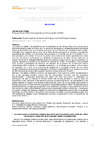Identificador persistente para citar o vincular este elemento:
https://accedacris.ulpgc.es/jspui/handle/10553/55699
| Campo DC | Valor | idioma |
|---|---|---|
| dc.contributor.author | Grau-Pineda, Carmen | en_US |
| dc.date.accessioned | 2019-06-06T17:28:32Z | - |
| dc.date.available | 2019-06-06T17:28:32Z | - |
| dc.date.issued | 2018 | en_US |
| dc.identifier.issn | 2444-3476 | en_US |
| dc.identifier.uri | https://accedacris.ulpgc.es/handle/10553/55699 | - |
| dc.description.abstract | "La economía digital o de plataformas se ha expandido en los últimos años como consecuencia directa del propicio caldo de cultivo que la revolución tecnológica y la descentralización productiva retos fundamentales a los que ha tenido que hacer frente el Derecho del Trabajo le han brindado. Entendida como negocios que se sirven de la Red (internet) para poner en contacto a clientes con proveedores de servicios a fin de realizar transacciones en el mundo real, se ha convertido en un tema prioritario y recurrente, no solo por lo positivo de la creación de empleo generada sino, sobre todo, por las dudas y suspicacias que despierta la gobernanza de estas nuevas relaciones de empleo. Dentro de la heterogeneidad de situaciones posibles, la aproximación que se propone en la presente aportación se centra en las plataformas virtuales que limitan su actividad al mero contacto entre usuarios y prestadores de servicios sin intervenir en el proceso de la prestación (meras intermediarias entre el cliente y el trabajador autónomo) y, en el debate que surge en torno al status del trabajador en el seno de la economía de plataformas y la posible creación de una nueva categoría profesional denominada «trabajador o contratista independiente», se posiciona en favor del relanzamiento de la figura del trabajador autónomo económicamente (TRADE)" | en_US |
| dc.description.abstract | «The digital or platform economy has expanded in recent years as a direct consequence of the of the favorable breeding ground that the technological revolution and the productive decentralization -fundamental challenges that Labor Law- they have given it. Understood as businesses that use the Internet to connect clients with service providers in order to carry out transactions in the real world, it has become a priority and recurring theme, not only because of the positive aspects of creation of generated employment but, above all, by the doubts and suspicions that the governance of these news employment relationships awakens. Within the heterogeneity of possible situations, the approach proposed in this contribution focuses on virtual platforms that limit their activity to simple contact between users and service providers without intervening in the process of provision (simple intermediaries between the client and the independent worker) and, in the debate that arises around the status of the worker in the economy of platforms and the possible creation of a new professional category called independent worker, is positioned in favor of relaunching the figure of the TRADE.» | en_US |
| dc.language | spa | en_US |
| dc.relation.ispartof | Nueva revista española de derecho del trabajo | en_US |
| dc.source | Nueva revista española de derecho del trabajo [ISSN 2444-3476], n. 213, p. 45-75 | en_US |
| dc.subject | 560504 Derecho constitucional | en_US |
| dc.subject | 5699 Otras especialidades jurídicas (Especificar) | en_US |
| dc.subject | 560507 Derecho público | en_US |
| dc.subject.other | Creación de empleo | en_US |
| dc.subject.other | Nuevas tecnologías | en_US |
| dc.subject.other | Economía digital | en_US |
| dc.subject.other | Economía de plataformas | en_US |
| dc.subject.other | Plataformas digitales | en_US |
| dc.subject.other | Revolución tecnológica | en_US |
| dc.subject.other | Industria 4.0 | en_US |
| dc.subject.other | Trabajadores independientes | en_US |
| dc.subject.other | Autónomos | en_US |
| dc.subject.other | Digital economy | en_US |
| dc.subject.other | Platformeconomy | en_US |
| dc.subject.other | Digital platforms | en_US |
| dc.subject.other | Technological revolution | en_US |
| dc.subject.other | Industry 4.0 | en_US |
| dc.subject.other | Independentworkers | en_US |
| dc.subject.other | Self-employedworkers | en_US |
| dc.title | La economía digital o de plataformas ("platform economy") como oportunidad para crear empleo autónomo ¿precario? | en_US |
| dc.type | info:eu-repo/semantics/article | en_US |
| dc.type | Article | en_US |
| dc.identifier.doi | 10.24310/rejlss.vi4.14055 | en_US |
| dc.description.lastpage | 75 | en_US |
| dc.description.firstpage | 45 | en_US |
| dc.investigacion | Ciencias Sociales y Jurídicas | en_US |
| dc.type2 | Artículo | en_US |
| dc.utils.revision | Sí | en_US |
| dc.date.coverdate | 2018 | en_US |
| dc.identifier.ulpgc | Sí | en_US |
| dc.contributor.buulpgc | BU-DER | en_US |
| dc.description.dialnetimpact | 0,0 | - |
| dc.description.dialnetq | Q2 | - |
| dc.description.dialnetd | D3 | - |
| item.fulltext | Con texto completo | - |
| item.grantfulltext | open | - |
| crisitem.author.dept | GIR ECOAQUA: Turismo, ordenación del territorio y medio ambiente | - |
| crisitem.author.dept | IU de Investigación en Acuicultura Sostenible y Ecosistemas Marinos (IU-Ecoaqua) | - |
| crisitem.author.dept | Departamento de Derecho Público | - |
| crisitem.author.orcid | 0000-0003-0274-8875 | - |
| crisitem.author.parentorg | IU de Investigación en Acuicultura Sostenible y Ecosistemas Marinos (IU-Ecoaqua) | - |
| crisitem.author.fullName | Grau Pineda, María Del Carmen | - |
| Colección: | Artículos | |
Visitas 10
80
actualizado el 10-ene-2026
Descargas
2
actualizado el 10-ene-2026
Google ScholarTM
Verifica
Altmetric
Comparte
Exporta metadatos
Los elementos en ULPGC accedaCRIS están protegidos por derechos de autor con todos los derechos reservados, a menos que se indique lo contrario.
